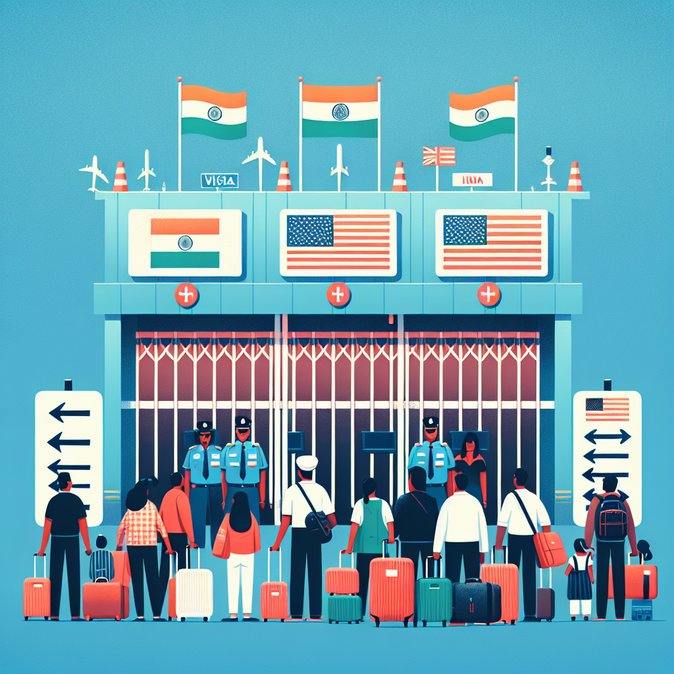
Indian outbound travel may be heading into fresh head-winds, according to Mahesh Iyer, Managing Director & CEO of Thomas Cook (India) Ltd. In an interview published on 13 November 2025, Iyer said the company is beginning to see “pockets of stress” as visa-processing times lengthen again for several long-haul markets—particularly the United States, the Schengen area and parts of the Middle East—and as border authorities worldwide intensify secondary screening of passengers.
Iyer noted that the average US B1/B2 interview wait in Indian metros is still measured in “hundreds of days” despite a concerted push by the US Mission earlier this year, while Schengen consulates have re-introduced biometric re-capture, slowing appointment throughput. “If these bottlenecks are not ironed out before the December–March holiday window, we could see travellers either diverting to nearby visa-light destinations or postponing travel altogether,” he said. Thomas Cook’s own booking data show a 17 % month-on-month drop in enquiries for Europe since mid-October.
![Visa delays and stricter checks could dampen Indians’ long-haul travel plans, warns Thomas Cook India]()
Beyond leisure, the CEO warned of knock-on effects for corporates. Project teams heading to the US and Continental Europe now need to build an additional eight to twelve weeks into mobilisation timelines. Some clients, he said, are routing executives through Singapore or Dubai to apply from third-country posts with shorter queues, adding cost and complexity. Heightened document scrutiny after a series of high-profile fraud cases in South Asia is also forcing travellers to carry more financial evidence and detailed itineraries.
The travel major, which returned to profitability in Q2 FY26, is lobbying embassies to ring-fence at least 10 % of appointment slots for business travellers and is ramping up its premium “Visa Assure” concierge to help applicants pre-vet paperwork. Iyer urged Indian companies to lock international assignments earlier than usual and to build flexible change clauses into air tickets and hotel contracts. In the near term, he expects short-haul corridors—Dubai, Thailand, Vietnam, and the brand-new visa-free Philippines link—to “pick up the slack” until processing pipelines normalise.
For mobility managers, the message is clear: anticipate longer lead times, budget for expedited services, and communicate policy changes quickly to travelling staff. Failure to do so could translate into missed client deadlines, re-scheduling penalties and traveller frustration during the crucial winter travel season.
Iyer noted that the average US B1/B2 interview wait in Indian metros is still measured in “hundreds of days” despite a concerted push by the US Mission earlier this year, while Schengen consulates have re-introduced biometric re-capture, slowing appointment throughput. “If these bottlenecks are not ironed out before the December–March holiday window, we could see travellers either diverting to nearby visa-light destinations or postponing travel altogether,” he said. Thomas Cook’s own booking data show a 17 % month-on-month drop in enquiries for Europe since mid-October.

Beyond leisure, the CEO warned of knock-on effects for corporates. Project teams heading to the US and Continental Europe now need to build an additional eight to twelve weeks into mobilisation timelines. Some clients, he said, are routing executives through Singapore or Dubai to apply from third-country posts with shorter queues, adding cost and complexity. Heightened document scrutiny after a series of high-profile fraud cases in South Asia is also forcing travellers to carry more financial evidence and detailed itineraries.
The travel major, which returned to profitability in Q2 FY26, is lobbying embassies to ring-fence at least 10 % of appointment slots for business travellers and is ramping up its premium “Visa Assure” concierge to help applicants pre-vet paperwork. Iyer urged Indian companies to lock international assignments earlier than usual and to build flexible change clauses into air tickets and hotel contracts. In the near term, he expects short-haul corridors—Dubai, Thailand, Vietnam, and the brand-new visa-free Philippines link—to “pick up the slack” until processing pipelines normalise.
For mobility managers, the message is clear: anticipate longer lead times, budget for expedited services, and communicate policy changes quickly to travelling staff. Failure to do so could translate into missed client deadlines, re-scheduling penalties and traveller frustration during the crucial winter travel season.








